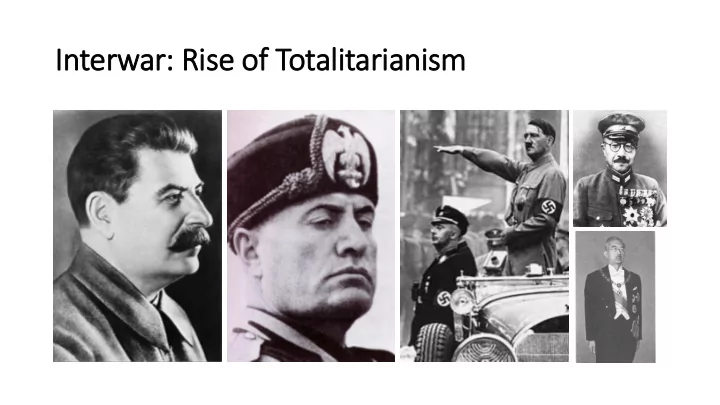

In Interw rwar: Ris ise of Totali litarianism
Joseph Stali lin • U.S.S.R. during the Interwar Period • Entrenchment of communism • Use of totalitarianism to create a powerful communist state • Stalin’s policies (command economy) • five-year plans : rapid industrial growth; steel coal, oil and electricity; military preparedness • collectivization of farms : large government farms; many people resisted • state industrialization : fell short of goal but strengthened USSR industry in world standing • secret police : force that went after dissenters of Stalin’s policies • Great Purge • a campaign of terror. It was directed at eliminating anyone who threatened his power
Adolf Hit itle ler • Germany during the Interwar Period • Inflation and depression • Failing economy due to WWI and Treaty of Versailles • Democratic government weakened (Weimer Republic) • Attempt at a democracy; members were blamed for war issues • Anti-Semitism • Derived from the fact that the earliest Jews were Semites; anti Jewish • Extreme nationalism • National Socialism (Nazism) & (Fascism) • National Socialist German Workers’ Party, called Nazi for short • supported by people in the middle and lower middle classes • German occupation of nearby countries • Rhineland (1936) • Austria (1938) • Czechoslovakia (1938 – 1939)
Benito Mussolini • Italy during the Interwar Period • Rise of fascism • militant political movement; emphasized loyalty to the state and obedience to its leader • to restore the glory of Rome • dreamed of building a colonial empire in Africa like England and France • Invasion of Ethiopia • ordered a massive invasion of Ethiopia in October 1935
Emperor Hir irohito and General Hid ideki Tojo • Japan during the Interwar Period • Militarism • Civilian government blamed for depression; Military leaders gained support and soon won control of the country • Industrialization of Japan, leading to drive for raw materials • Raw materials in Manchuria; oil in China • Invasion of Korea, Manchuria, and the rest of China • Seized Korea in 1907 • Seized Manchuria in 1931 • Seized China in 1937
Recommend
More recommend